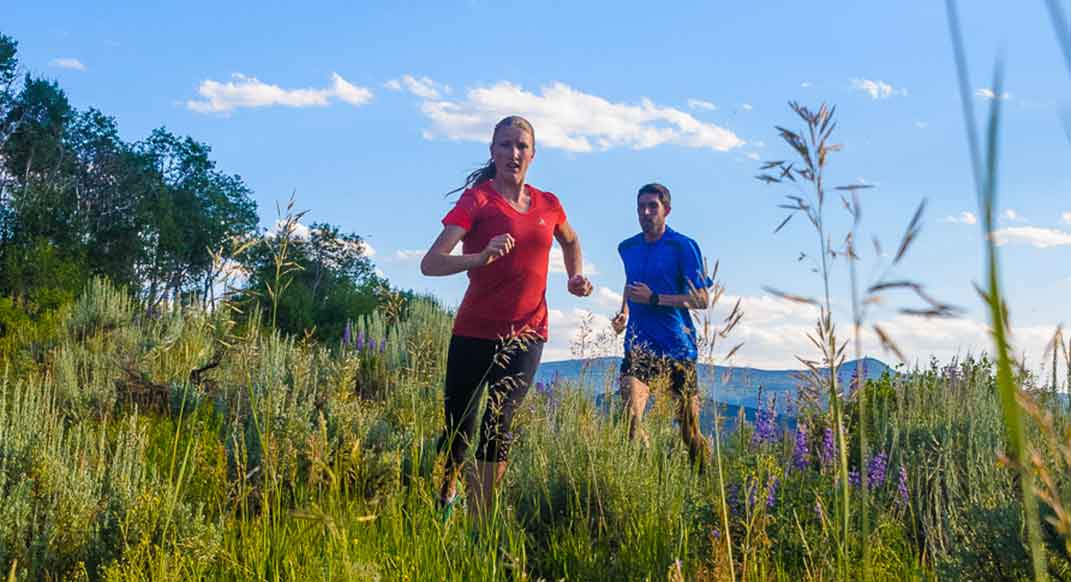Fuel Your Running Without Breaking the Bank

“Look! It’s an entire hillside of dandelion greens and raspberries. We’re rich—with nutrients!”
Midway through a run beneath Kendall Mountain in Silverton, Colorado, Tyler began harvesting wild fruits and veggies.
I laughed. But as the bundle of greens and juicy, ripe berries grew thicker, I realized he was on to something. In a typical supermarket, a box of organic raspberries could cost up to seven dollars. A large bag of farm-fresh greens would cost about the same.
At our campsite later that night, by the light of our headlamps, we fried the dandelion greens with some coconut oil and brown rice, and then savored the raspberries for dessert.
Often, fueling a running lifestyle is expensive. But, you don’t need to forage or dumpster-dive in order to eat well on a budget.
Registered dietician Heather Caplan explains that there are many nutritional bargains in your standard supermarket. While actual pricing varies based on where you’re buying and your personal preferences (i.e. organic or conventional), Caplan recommends these budget-friendly training foods.
Beans or lentils
Beans are a good source of plant-based protein—mix with rice to make them a complete protein. No matter which variety you go with (kidney, black, pinto etc.) you’ll get a good source of fiber, folate, iron, calcium, potassium and magnesium. Purchase them dried if you want to save a few bucks and buy in bulk.
Potatoes
White potatoes are often villainized in the debate between good versus bad carbohydrates, but there’s no reason to omit them from your diet. For runners especially, both white and sweet potatoes are a good source of carbohydrates, fiber, vitamin C and magnesium. They also provide some iron and plant proteins (which need to be paired with complimentary plant proteins like rice or beans and/or an animal protein to create a complete protein). Compared with white potatoes, sweet potatoes are lower in protein and vitamin C, but provide well over the daily recommended intake of Vitamin A.
Broccoli
Known as the “King of vegetables,” broccoli is relatively easy to find in grocery stores (fresh or frozen) and the whole vegetable is edible (don’t throw away the stems!). It provides your entire day’s vitamin C needs, and is a good source of potassium, fiber and vitamin A.
Bananas
Bananas are a staple in most runners’ diets anyway, since they’re a high-carbohydrate fruit that’s easy to digest and mixes well with nut butters. They’re usually priced at around 50 cents per pound, and provide a good dose of carbs, fiber and potassium. They’re easy to pack, mix well in sandwiches and cereals, and make a good on-the-go snack.
Milk
If you’re in the minority of adults who tolerate all forms of dairy, milk is an inexpensive way to get protein, calcium and some sugars. It’s also typically fortified with Vitamin D, which is otherwise hard to come by through foods.
Chicken or beef broth
If you’ve ever volunteered for or run through an ultramarathon aid station, you know why this is on the list. Broths are high in sodium, easy to digest and even provide some carbohydrates, vitamins and minerals. They’re an inexpensive alternative to pricey sports drinks, especially if you get tired of sweet or citrus-flavored beverages.
Spinach
All leafy greens can be inexpensive if you’re okay going conventional (as opposed to organic), or buy from a local farmer’s market. Spinach has a milder taste than other raw greens, like kale or collards. It’s a good source of vitamins A and C, and provides some iron, calcium, magnesium and potassium. If you buy in bulk, it’s easy to cook down into sauces, soups, egg scrambles or a mixed-vegetable stir-fry.
And what about those dandelion greens? The bitter taste is certainly not for everyone, which is why dandelion greens are not widely sought after in supermarkets, keeping the cost low. However, Caplan praises their cost-to-nutrient ratio, “They’re an excellent source of some B vitamins (1, 2 and 6); vitamins A, K and C; fiber, calcium and iron. Use them in a salad or as a topper to break up the taste.”
For runner’s looking for a simple, low-cost and delicious meal to satisfy their taste buds, nutrient requirements and caloric needs when training loads are up a hearty burrito will never steer you wrong.
Caplan backs this up, “You get complete proteins from mixing the beans and rice, a variety of micronutrients with the vegetables and beans and unsaturated fats from the stir-fry oil,” she says.
Burrito filling is easy to make in bulk for leftovers and are also portable to carry along as fuel during a big run. Below is a recipe that came about while camping and running in Bears Ears National Monument but the recipe is versatile enough to supplement with whatever ingredients you have on hand or flavor preferences.
The Comb Ridge Cowgirl Burrito
Serves 2
1 can ranch-style beans
1 sweet potato or regular potato (cut into cubes)
½ Onion (diced)
1 Red Pepper (cut into thin strips)
Handful of greens (finely chopped)
1-2 Tablespoons oil (olive oil, coconut oil or butter)
Salt and pepper to taste
Optional: (While these items cost a bit more they certainly can add flavor and nutrients):
– ½ Cup Shredded Cheese
– Avocado
– Steak
- Place oil in a cast iron pan on medium and let it heat up.
- Add cut sweet potatoes and diced onions, sauté until the potatoes are tender.
- Toss in the remaining veggies (Peppers and greens) until they are lightly cooked. Season with salt and pepper.
- Open and pour in the can of ranch style beans, mix with the other ingrediants and let them simmer and warm up for a few minutes.
- Once all the ingredients are heated through warm up two large tortillas on another pan, then fill with the mixture, roll up and serve right away.
- Devour!